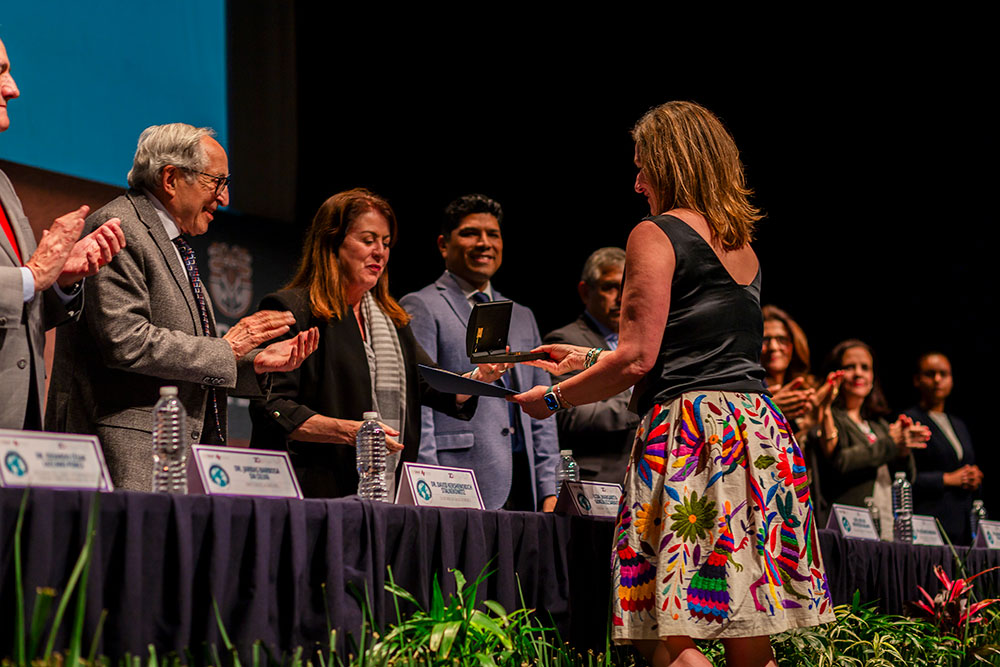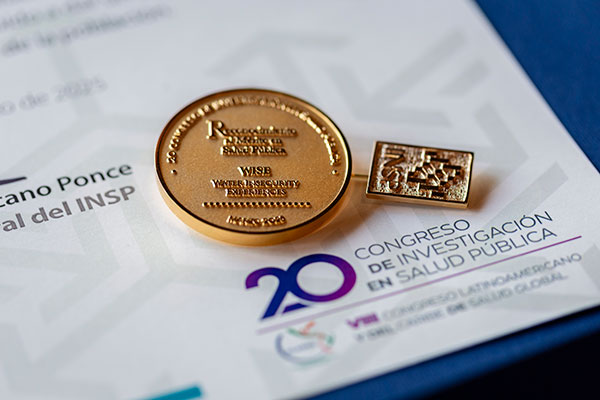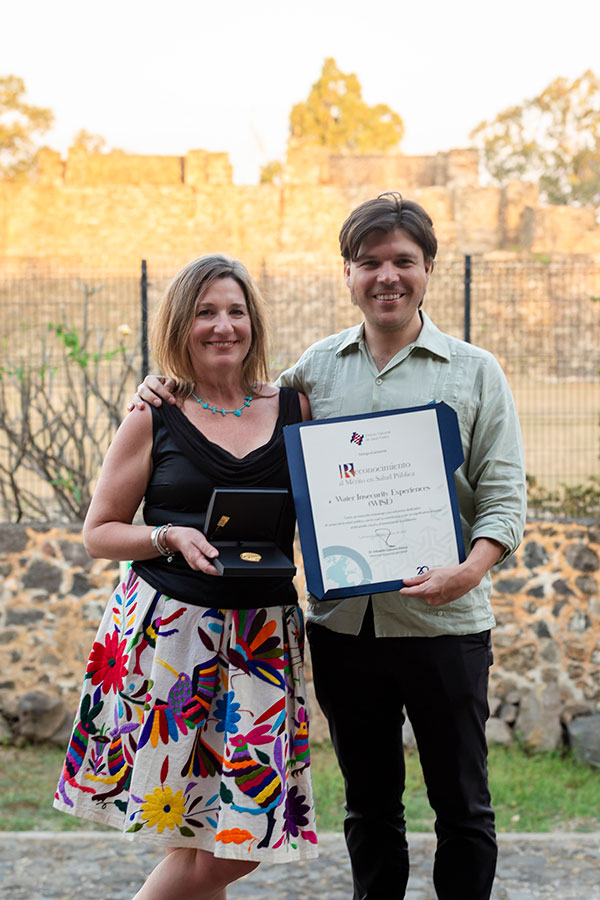Efforts to Measure Water Insecurity Scale Up in Mexico and Latin America
Sera Young accepts inaugural award for the WISE Scales’ humanitarian contributions
Get all our news
Even though I physically received the prize, this is an award that recognizes the work of many—literally hundreds of people have worked to develop, implement, and use the WISE Scales.”
Sera Young
IPR anthropologist

Sera Young receives the “Champions of Health” Award from Mexico's National Institute of Public Health in Cuernavaca, Mexico on March 4, 2025.
In July 2022, Mexico declared a state of emergency because of an extreme drought in a number of states. In some places, drinking water became impossible to buy, and even buckets to hold water were in short supply, according to the New York Times.
In the northern state of Nuevo León, wells and dams were running out of water, and many low-income homes didn’t have adequate tanks to store water. In response, the state government added the Water Insecurity Experiences (WISE) Scales to their household poverty survey to have more granular data about future water crises. This information now guides their drought responses, which include distributing bottled water, setting up community water tanks, and establishing hotlines to report problems with water.
“An important achievement of the work in Nuevo León is that the state government included water in the suite of indicators they use to allocate funds to mitigate poverty,” said Pablo Gaitán-Rossi, director of the Research Institute for Equitable Development (EQUIDE), at Universidad Iberoamericana in Mexico. “This is a neat example of how water insecurity intertwines with poverty.”
Nearly three years later, on March 4, 2025, IPR anthropologist Sera Young accepted the inaugural “Champions of Health” Award on behalf of the WISE Scales. This prestigious award was given by the Director of Mexico’s National Institute of Public Health (INSP) at the Teopanzolco Cultural Center in Cuernavaca, Mexico. It was established to recognize “leadership, commitment, and humanitarian contributions to health in the Americas and beyond.”

The WISE Scales received the Champions of Health Award for their
impact on public health.
“It was an incredible honor to receive the inaugural prize, especially as someone from outside Latin America,” said Young. “Even though I physically received the prize, this is an award that recognizes the work of many—literally hundreds of people have worked to develop, implement, and use the WISE Scales.”
Young led the development of the WISE Scales by a group of more than 50 researchers and practitioners. Their purpose is to better quantify problems people encounter with access, use, and reliability of water in their homes.
First published in 2019, the WISE Scales is a survey consisting of 12 questions, including how often people feel angry because of their water situation and how often they are worried they won't have enough water. Responses provide a more holistic view of the emotional toll of water insecurity for individuals and households, going beyond just measuring water availability and infrastructure.
More than 100 organizations in 80 countries, such as Gallup World Poll, the World Bank, and the UN’s Food and Agriculture Organization, have used the WISE Scales to understand people’s lived experiences with water. In 2021, Young and her team began working with the INSP. Since then, the WISE scales have been implemented nationally in Mexico's Health and Nutrition National Survey (ENSANUT) on an annual basis.
Young received the Champions of Health Award during an international conference hosted by INSP between March 3–7, which focused on public health in Latin America. A pre-meeting on March 2 focused on public health and water insecurity. It was attended by members of organizations including UNICEF, FAO, the Center for Latin American Rural Development (RIMISP), the Caribbean Public Health Agency, and Cuba’s National Institute of Hygiene, Epidemiology, and Microbiology.

Sera Young and Pablo Gaitán-Rossi hold the
Champions of Health Award.
The Cuernavaca meeting in March was a follow-up from a 2023 conference in Mexico City hosted by Northwestern University in partnership with Universidad Iberoamericana and INSP to develop a consensus around measurements of food and water insecurity. The Institute for Policy Research and the Buffett Institute for Global Affairs provided support for the 2023 conference.
At the March 2025 meeting, translations of WISE Scales implementation manuals were published in Spanish, Portuguese, and French by the WISE-LAC Research Network, a regional initiative in Latin America and the Caribbean to prevent water insecurity by developing data, research tools, and policy recommendations. Young and Gaitán-Rossi lead the WISE-LAC Research Network.
“The WISE-LAC network is fostering what I can best describe as a family of researchers and policymakers throughout the region,” said Young. “They support each other to promote the science incredibly rapidly.”
Latin America is one of many regions around the globe struggling with water availability and access. According to Gallup World Poll data from 2020, a significant number of people living in Honduras, Guatemala, and Brazil experience high rates of water insecurity.
Young also announced that Gallup World Poll will implement the WISE Scales in 40 additional countries in 2025. Ten of those countries are in Latin America and the Caribbean, and they include Argentina, Bolivia, Chile, Colombia, the Dominican Republic, El Salvador, Jamaica, Panama, Uruguay, and Venezuela.
“Data is a key resource to make water insecurity visible in these countries and a clear entry point for governments to start monitoring an indicator so close to people’s wellbeing,” Gaitán-Rossi said.
The additional data gathered by Gallup World Poll will reveal the hidden problems millions of people experience with water.
“Our goal is to make the most vulnerable of us more water secure,” Young explained. “And to do that, we have to make these invisible problems visible.”
Sera Young is professor of anthropology and global health, an IPR Morton O. Schapiro fellow, and co-director of the Center for Water Research at Northwestern University.
Photo credits: Vanessa Bly
Published: April 10, 2025.


